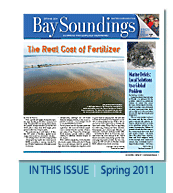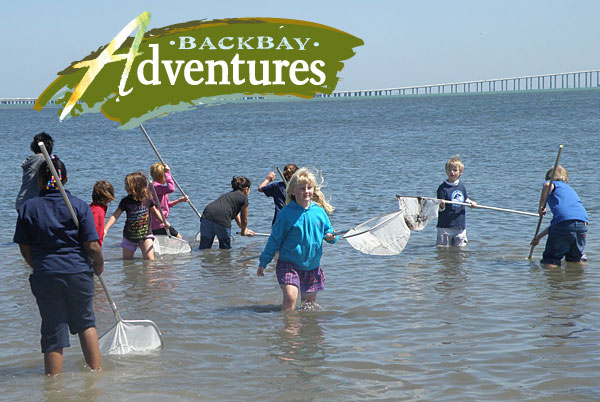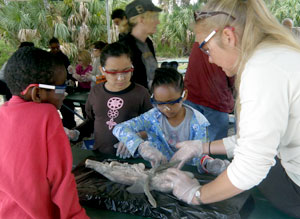 |
||||||||
Nature's Academy Training a New Generation of
Environmental Stewards
Dana Pounds doesn't expect to see an overnight change in the world -- but give her a couple of years. As founder and executive director of the not-for-profit Nature's Academy, Pounds is building a program that will allow every fifth grader in Pinellas and Manatee counties to spend a day outside exploring Tampa Bay's unique ecosystems by the year 2020.
Sign Up Now for Popular Summer Camps
Spring has sprung – that means it's time to sign up for summer camps if you want to participate in the most popular events. Along with regional attractions, many cities offer summer camp programs with science themes, including St. Pete Beach, Clearwater and Tampa. Contact your local government for more information. Some of the best regional camps for budding environmental stewards are listed alphabetically.
Boyd Hill Nature Preserve: A 245-acre park located on the shores of Lake Maggiore in St. Petersburg featuring more than three miles of trails and boardwalks and five unique ecosystems plus six different summer camps. Call 727-893-7326 or visit www.stpete.org/boyd/daycamps.asp.
Brooker Creek Preserve: An 8,500-acre wilderness area located in the northeastern corner of Pinellas County features multiple programs for adults and children scheduled year-round, including summer camps. Call 727-453-6800 or visit www.brookercreekpreserve.org.
Busch Gardens Summer Camps: The nationally known attraction also offers behind-the-scenes summer camps for local kids. Call 1-877-248-2267 or visit www.swbg-adventurecamp.com/adventure-camps.
Camp Bayou: Although the camp doesn't offer regularly scheduled classes, it is open for field trips with programs that range from general ecology and river habitats to the importance of pollinators and gopher tortoises. Call 813-363-5438 or visit www.campbayou.org.
Camp Invention: Sponsored by the National Inventors Hall of Fame Foundation in partnership with the U.S. Patent and Trademark Office, camps are scheduled in various locations across the region. For more information, call 800-968-4332 or visit www.campinvention.org.
Clearwater Marine Aquarium: Coastal learning experiences with summer camps are available for students K-12. Or spend the day at CMA for a laid-back look at Tampa Bay's wildlife, including Winter, the dolphin with the prosthetic tail in a new tank with underwater viewing windows. Call 727-441-1790 or visit www.seewinter.com.
Destination Aviation: Students ages 11-18 can learn to fly while exploring the science and technology of aviation. Both day and residential camps are offered at Florida Air Museum in Lakeland. Call 863-904-4073 or visit www.floridaairmuseum.org.
Discover! Girl Scouts of West Central Florida Residential Camps: More than 100 sessions in three residential camps are offered across the region with themes including science and technology. Call 813-281-4475 or visit www.gswcf.org.
Eckerd College: Located on the shore of Boca Ciega Bay, Eckerd's camps for kids are open to ages 5 to 17 with classes ranging from sailing and fishing to marine science. Call 800-456-9009 or visit www.eckerd.edu/waterfront.
Estuary EDventures Summer Camps: Tampa Bay Watch expands its summer camp offerings with multiple opportunities for learning and adventure from its Tierra Verde headquarters. Call 727-867-8166 or visit www.tampabaywatch.org.
Florida Aquarium AquaCamps: Diverse offerings for kids from ages 3 to 15 with a strong focus on science and wildlife encounters in downtown Tampa. Call 813-273-4000 or visit www.flaquarium.org.
Great Camps at Great Explorations Children's Museum: Themed camps including science are featured with volunteer opportunities for children over 13 in St. Petersburg. Call 727-821-8992 or visit www.greatexplorations.org.
Lowry Park Zoo: Tampa's award-winning zoo hosts more than 100 week-long camps for kids K-8. Call 813-935-8552 or visit www.lowryparkzoo.com.
Mad Science Summer Camps: Budding scientists can attend camps in multiple locations across the region to learn to make indoor lightning, launch rockets and experience a giant vortex. Call 727-895-5595 or visit www.madscience.org/tampabay.
MOSI Summer Science Camp: Take advantage of learning adventures in a wide range of science and technology areas for ages 2-18 at the region's top science museum. Call 800-995-6674 or visit www.campfun.org.
Mote Marine Aquarium's Summer Camps: Hands-on marine science camps for kids from 2-18 on Longboat Key. Call 941-388-4441 x229 or visit www.mote.org/summerprograms.
Nature's Classroom Summer Camps: A series of programs open to students exiting fourth-to-eighth grade include wilderness, survival and outdoor skills camps. Water Adventure Camps, sponsored by the Southwest Florida Water Management District, are free and include a field trip to Crystal Springs Preserve. Call 987-6969 ext 221 or 222 or visit www.naturesclassroom.net.
Pathfinder Outdoor Education Summer Camps: Day or overnight camps in locations across the region exploring nature and developing student leadership. Call 727-328-0300, ext. 221 or visit www.pathfinder-ed.org.
Pier Aquarium Summer-ful of Fish and Fun in the Sun: Eleven camps combine marine science with other activities for students entering grades 1-6 in downtown St. Petersburg. Call 727-895-7437, ext. 205 or visit www.pieraquarium.org.
Science Center of Pinellas Summer Camps: The nation's oldest science center offers a full schedule of summer camps for kids from K-12. Call 727-384-0027 or visit www.sciencecenterofpinellas.org.
University of South Florida's St. Petersburg Campus: Camps for kids ages 8-18 include kayaking, snorkeling and sailing. Call 727-873-4597 or visit www.stpete.usf.edu/waterfront/events.htm
Weedon Island Preserve Cultural and Natural History Center: A series of camps introduce kids ages 6-12 to the natural wonders of Weedon Island. Call 727-453-6503 or visit www.weedonislandpreserve.org.
"We don't expect to see a visible impact immediately but we hope that 10 or 15 years from now, the kids we're working with now will grow up to be adults with a completely different outlook on how we need to take care of Tampa Bay," Pounds said. "We're breeding a new generation of environmental stewards."
With funding through the Southwest Florida Water Management District, the Tampa Bay Estuary Program and the Gulf of Mexico Alliance, 500 students will participate in Nature's Academy programs, either at their Fort De Soto education center or in Manatee County at Coquina Beach this school year. (In Hillsborough County, sixth-grade students can participate in similar programs at Nature's Classroom on the Hillsborough River.)
Teaching students about the interconnectedness of nature is good for both the kids and Tampa Bay's ecosystems, Pounds notes. Among the 300 students who completed the program last year, 88% showed learning gains – a significant improvement in a state where more than half of the fifth graders fail the science section of standardized tests.
Along with clear improvements in their knowledge levels, the hands-on experience focuses on ways students can make a difference in the environment, Pounds said. "We end every program with a mini coastal cleanup – a contest to see which team can collect the most trash in 10 or 15 minutes."
Even on the relatively pristine beaches of Fort De Soto, it's easy to pick up two to eight pounds in a very short time. "The kids are pretty impressed that such a small effort can have such a huge impact."
Focus on Fifth-Graders
While Nature's Academy offers diverse programs for K-5 students in locations that range from local schools to the Florida Keys, the Island Adventure for fifth graders is where Pounds is focusing most of her efforts. "We'd like to get students through the program in September or October so they can build on the science skills they learn here and be ready for the FCAT in April," she said.
To share enthusiasm for what they've discovered on their Island Adventure, student groups are given small stipends to develop posters or projects they can share with their families and other children in their schools. "They're the 'seniors' in their schools and that gives them the opportunity to inspire younger kids. We want Island Adventure to be something every kid looks forward to."
Hands-on learning experiences at Island Adventure starts with dissecting a shark – which also leads to discussions on scientific taxonomy and aerodynamics, how sharks, turtles and fish can be unintentionally killed as bycatch, and the concept of food webs where ecosystems would be out of balance without their top predators.
A nature walk introduces students to the problems caused by invasive plants, the value of barrier islands and other ecosystems in protecting the region from hurricanes, and insights into how Indians used the habitat. For instance, broomsedge is named because Indians bundled up the native grass to clean their floors. Students get to taste a small bite of Hercules Club, a plant the Indians called "toothache tree" because chewing on the leaves caused a temporary numbness in their mouth.
For most students, the highlight of the day is a trip on or in the water. Depending on the school system and the weather, some kids kayak through one of Fort De Soto's protected lagoons where dolphin and manatees are occasionally seen. Others use dip nets in the seagrass beds off the eastern tip of the park.
"The most dangerous part of dip-netting is the dip net," warns Billy Payne, director of education, demonstrating what happens when someone swings the long-handled net without watching where it goes. With those reassuring words, even the shy kids romp out to the shallow beds, scooping up sea critters and then scampering back to shore with their treasures.
One chilly March morning, more than 50 students from Gulfport Montessori Elementary School captured everything from fish and crabs to an awe-inspiring string of lightning whelk egg cases. Specimens were placed in clear plastic containers and passed around for inspection.
"Are you sure this fish will get big enough to eat?" asks one kid peering at a juvenile drum. Another carefully held the container with a small blue crab waving its claws in a frantic attempt to escape – obviously unhappy to be the center of attention. A captured jellyfish looks just like an empty plastic bag, commented another student. "That's why they're so dangerous for sea turtles," Pounds responds. "Turtles love jellyfish but plastic bags can kill them."
The afternoon ends, as do all programs at Nature's Academy, with a coastal clean-up. Scurrying across the beach, kids picked up a plastic bag here or an old flip-flop there, along with the ubiquitous cigarette butts and aluminum cans.
Just as Pounds predicted, they were amazed at what they accomplished in just a few minutes. "Just think what would happen if every one of us picked up just one piece of trash every day," she tells the kids. "It's such a simple thing but it can make a big difference."
Special Classes for Teachers
Hands-on teaching isn't just for kids – introducing teachers to the benefits of outdoor learning is an important priority at Nature's Academy too. They'll host a special event just for Pinellas teachers beginning at 9 a.m. on Saturday, May 7, followed by a similar program on June 11 at Coquina Beach for Manatee County teachers.
"Many teachers weren't exposed to outdoor learning themselves so they may not recognize its value," says Pounds. "They all know field trips are fun but they're not always aware of the learning opportunities."
In nearly every case, Pounds can help teachers apply for grants that pay the entire cost of the trip. "Agencies like the Southwest Florida Water Management District, Tampa Bay Estuary Program and Gulf of Mexico Alliance recognize the need to fund programs that teach kids about water resources and the environment. We've been successful in partnering with them so we can provide field trips at no cost to students or teachers – even including bus transportation."
Along with field trips to Fort De Soto or Coquina Beach, Nature's Academy offers a wide variety of programs for students in K-5.
Space in this special workshop is limited and available on a first-come, first-serve basis to teachers and administrators in Pinellas County. For more information, visit www.naturesacademy.org or call 941-538-6829.


